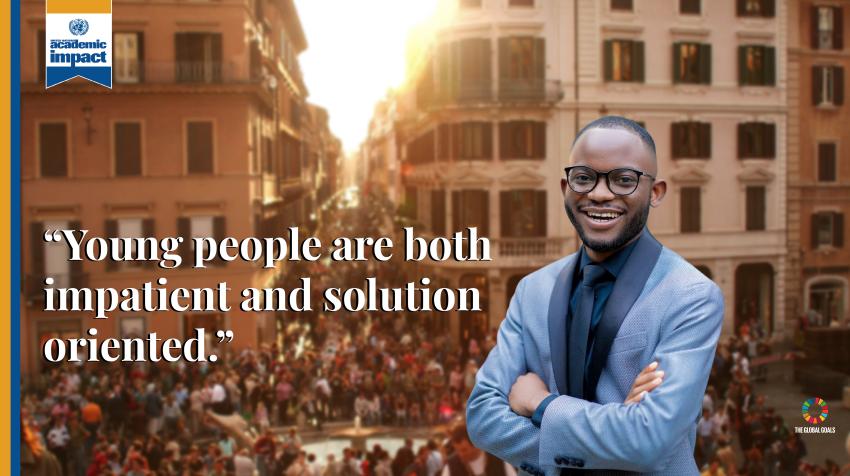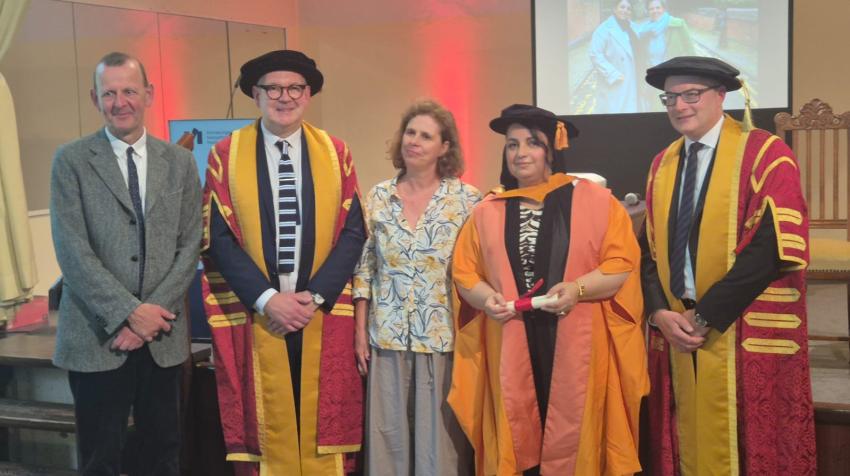Tired of waiting for the older generation to solve global issues, youth activism is gaining momentum at an unprecedented pace. Recent advances in technology have made it much easier for voices of youth to be heard across the globe. In this “Youth in Digital Activism” series, UNAI features young activists taking the world’s most pressing issues into their own hands.
As an activist himself, who also works to promote the importance of youth in creating change, Brighton Kaoma, Global Director of the Sustainable Development Solutions Network Youth initiative, serves as the right person to wrap up the "Youth & Digital Activism" series.
Brighton was born and raised in Zambia. At the age of 14, he became a radio broadcaster with a focus on climate change and garnered some 2 million weekly listeners. His activism inspired thousands of young people across Africa and beyond. In 2015, he was awarded the Queen's Young Leaders award by Queen Elizabeth II at Buckingham Palace, United Kingdom, for his exemplary leadership in sustainable development. Also in 2016, he became the first African to be awarded the Global WWF International President's Award, an award by the World Wildlife Fund to honour outstanding young people who are committed to protect the nature and help people live in harmony with nature.
You have been engaged in climate action from an early age. Among other things, you started a podcast and founded a non-profit organisation called the Agents of Change Foundation, which trained and equipped young people with tools and skills to express their ideas and share their stories. What motivated you, and what led you to act?
Due to mining activities in the Kitwe District in Zambia, known for its mineral-rich ‘Copperbelt’ region, there were days when the grey haze from the mines in my community was so thick that children could barely see across the street when walking to school in the winter. The irritants in the air led to sinus infections that went on for weeks if not months. The residents of Kitwe and other neighbouring districts were concerned about what the inhalation of the gas might do to their brains, eyes, sinus and lungs.
This experience inspired me to act and hold leaders to account, leading me to co-found multiple national and regional organizations. I became a country manager for the Children’s Radio Foundation, a non-profit organization in South Africa, and also supported the Zambia country office of the United Nations Children’s Fund (UNICEF) as in-country coordinator for the Voices of Youth, UNICEF’s digital community dedicated to youth.
What led you to work to promote the importance of youth? How would you characterize today's youth activism?
We have about 1.9 billion young people globally and there is no better constituency to work with, who also happen to be the most educated and tech-savvy generation. Young people are both impatient and solution oriented. It’s those two distinct attributes that inspire me to work with young people.
Youth-led activism manifests itself in various ways. Today we have young people who are using their voices, talents and influence to demand change in their communities. Technology, especially social media, has made activism stronger thanks to its ability to proliferate knowledge and information. Today’s activism is different from that in the 1970s and 80s because it has become much easier to collaborate across platforms and on broader issues of common interest.
Have you encountered any concrete impact youth activism has had on politics or decision making?
Examples of where young people led the change are too numerous to mention. In the present day, young people are leading the change in politics and business. In my home country Zambia, young people used social media to create significant political change. Fridays For Future movement, a youth-led and organised movement that began in August 2018 in Sweden with climate activist Greta Thunberg, has equally shown tremendous results in putting young people at the centre of change.
Data suggest that youth today are keen on solving the global issues. For example, a recent survey by the United Nations Development Programme (UNDP) showed that young people are more worried than adults about, for example, climate change; why do you think this is the case?
Young people are tired of today’s leaders not taking any action. I understand their frustration. We are worried about climate change and the lack of intergenerational equity, coupled with racial injustice. But we are optimistic about the future of our planet and will stop at nothing to create change ourselves.
What is the SDSN Youth doing to promote youth involvement towards social issues? What are the biggest challenges for the programme?
Our programmes are designed to foster growth. We empower young people to drive sustainable solutions, regardless of their origin, stage of life, level of knowledge, or problem they are trying to solve. Through our Youth Solutions Program, Local Pathways Program and SDG Student Program, we are building a network of active citizens from around the world. SDSN Youth has galvanised a movement of over 5,000 young leaders, offering them pathways to accelerate solutions for the Sustainable Development Goals.
I would not say we have challenges. I would say we have a prime opportunity to reach those left behind. The task ahead is enormous, and we are looking at strengthening our partnerships with other organizations working at the intersection of youth and SDGs. We want to reach more young people in universities and high schools, along with start-up founders, to advance our agenda.
Do you have any advice for youth passionate about social issues and want to contribute to making a change?
Identify what you are passionate about. Find allies and people who believe in you and your idea, and chase after your dreams. It always seems impossible until it is done.




